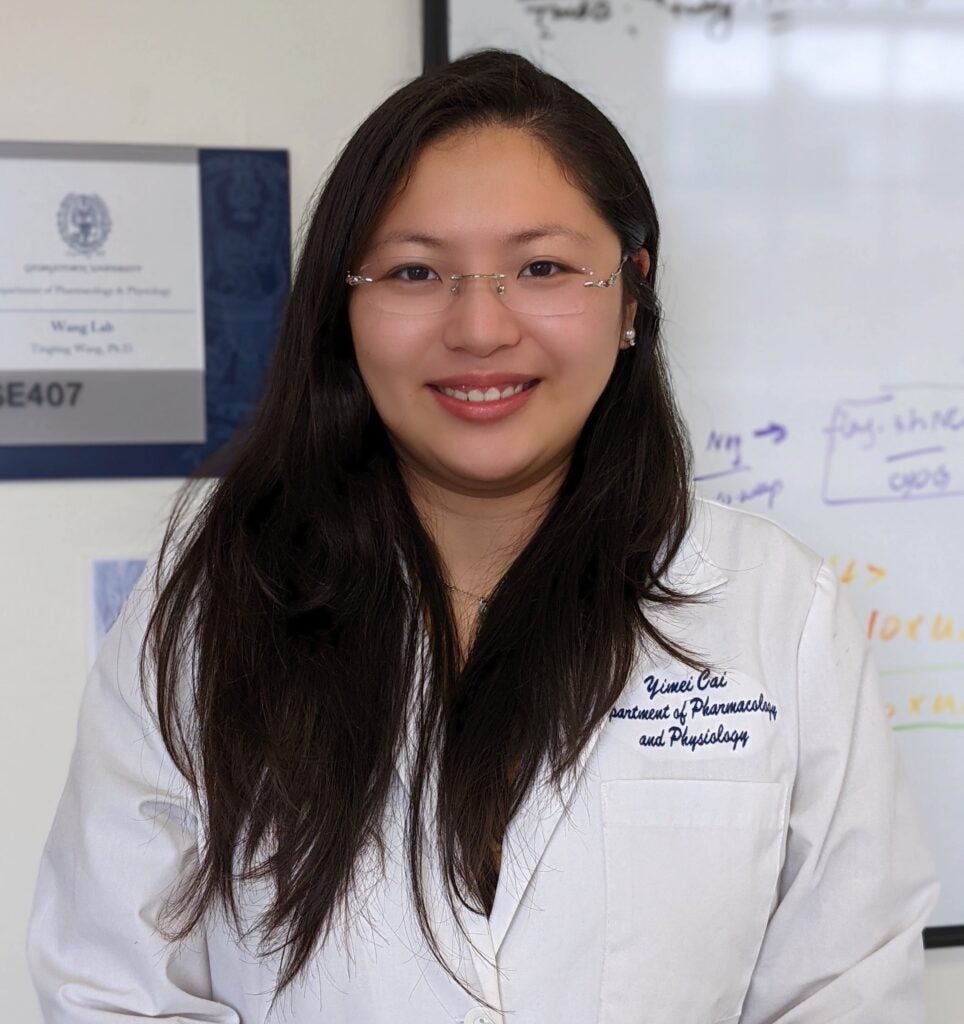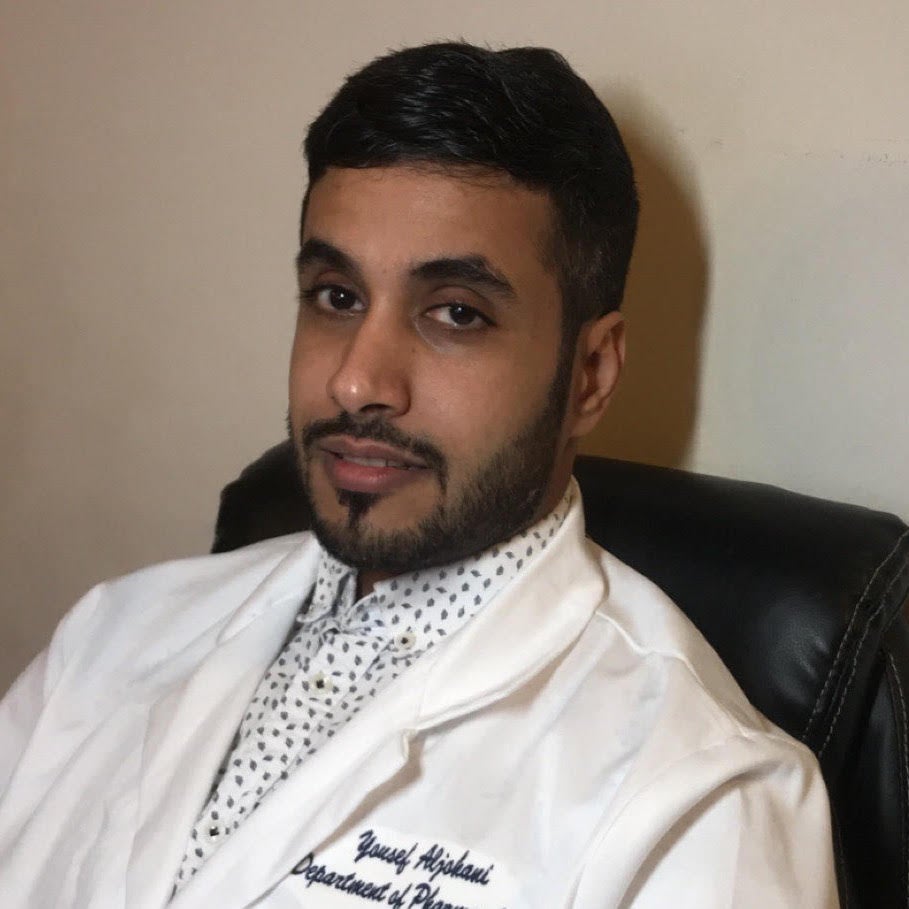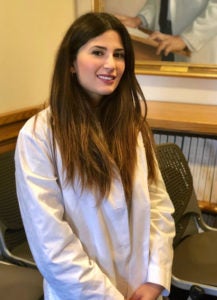PhD Students
If you are a prospective PhD student interested in speaking to a current PhD student, please reach out to one of our student representatives:
- Megan Beaver – Faculty Liaison
mb2318@georgetown.edu
Entered 2021; Evans Lab - Katie Hummel – Treasurer
ksh89@georgetown.edu
Entered 2020; Conant Lab - Lindsey Russ – Social Chair
lar164@georgetown.edu
Entered 2022; Evans Lab
2023
2022
2021
2020
2019
2018
Program Graduates
2023
- Mai Abdel-Ghani, Ph.D.
- Selena Garcia DuBar, Ph.D.
- Griffin Greco, Ph.D.
- Bryce Jones, Ph.D.
2022
- David Castellano, Ph.D
- Andrew Heitman, Ph.D
- Safwan Hyder, Ph.D.
- Amanda Schneeweis, Ph.D.
2020
- Seham Alaiyed, Ph.D. (Lecturer, Unaizah College of Medicine) dissertation and abstract
- Elyssa LaFlamme, Ph.D. (RQM+) dissertation and abstract
- Thien Nguyen, Ph.D. (RA Capital Management) dissertation and abstract
2019
- Evan Wicker, Ph.D. (Russo Partners LLC) dissertation and abstract
- Erin Wenzel, Ph.D. (Spero Therapeutics) dissertation and abstract
2018
- Megan Huizenga, Ph.D. (Greenwich Biosciences) dissertation and abstract
- Sarra Djemil, Ph.D. (Post-doc Georgetown U) dissertation and abstract
- Nour Al-muhtasib, Ph.D. (Post-doc Yale U) dissertation and abstract
- Clint Kinney, Ph.D. (Post-doc U Tennessee Health Science Center) dissertation and abstract
2017
- Carrie Bowman Dalley, Ph.D. (Assistant Professor, Georgetown University School of Nursing) dissertation and abstract
- Monica Javidnia, Ph.D. (Post-doc U Rochester) dissertation and abstract
- Khalid Garman, Ph.D. (Post-doc NIH) dissertation and abstract
2016
- Rashmi Venkatesh, Ph.D. (FDA) dissertation and abstract
- Jisoo Lee, Ph.D. (Post-doc Georgetown University) dissertation and abstract
- Michael Shih, Ph.D. (Novartis) dissertation and abstract
- Amanda Lewin, Ph.D. (FDA) dissertation and abstract
2015
- Kristen DeDominicis, Ph.D. (post-doc Walter Reed / Odyssey Systems) dissertation and abstract
- Tara Gelb, Ph.D. (post-doc NIH / Bicycle Therapeutics) dissertation and abstract
2014
- Hannah Hathaway, Ph.D. (post-doc U Colorado / DSST Public Schools) dissertation and abstract
- Yasmine Ibrahim, Ph.D. (post-doc U Florida) dissertation and abstract
- Ruixi Luo, Ph.D. (post-doc Tech Res Intl / AnGes USA) dissertation and abstract
- Lee Campbell, Ph.D. (post-doc NIDA / Research Assistant Professor at Georgetown University) dissertation and abstract
- Edward Tuan, Ph.D. (Astraea Therapeutics / Strateos) dissertation and abstract
2013
- John DiRaddo, Ph.D. (Emory U) dissertation and abstract (new window)
- Jordan Li, Ph.D. (NIH / Dovel Technologies) dissertation and abstract (new window)
- Jesse Hanisch, Ph.D. (MD, Creighton U / Surgery) dissertation and abstract (new window)
- Sarah Haviland, Ph.D. dissertation and abstract (new window)
2012
- Janell Richardson, Ph.D. (Post-doc Western University) dissertation and abstract (new window)
- Jonathan Ritter, Ph.D. (Post-doc, Children’s National Medical Center) dissertation and abstract (new window)
- Guy Rodrigue Takoudjou, Ph.D. (Medical School, Chad) dissertation and abstract (new window)
- Patrick Hussmann, Ph.D. (Johns Hopkins U; NIH) dissertation and abstract (new window)
- Yeunkum Lee, Ph.D. (Post-doc KAIST) dissertation and abstract (new window)
2011
- Arianne Motter, Ph.D. (FDA) dissertation citation and abstract (new window)
- Linda Lomazzo, Ph.D. (Johannes Gutenberg U) dissertation citation and abstract (new window)
2010
- Maryna Baydyuk, Ph.D. (Asst Prof Georgetown U) dissertation citation and abstract (new window)
- Shahrzad Movafagh, Ph.D. (Asst Prof Shenandoah U) dissertation citation and abstract (new window)
- Megan Janssen Schroeder, Ph.D. (NIH) dissertation citation and abstract (new window)
- Einsley Janowski, M.D., Ph.D. (GU Med School) dissertation citation and abstract (new window)
2009
- David Kodack, Ph.D. (Harvard U) dissertation citation and abstract (new window)
2008
- Brandon Cox, Ph.D. (So. Ill. U.) dissertation citation and abstract (new window)
- Stephen Belmonte, Ph.D. (U Rochester) dissertation citation and abstract (new window)
- Mark Fereshteh, Ph.D. (Duke U) dissertation citation and abstract (new window)
- Jonathan Leshin, Ph.D. (U Maryland) dissertation citation and abstract (new window)
- Jose Matta, Ph.D. (NIH PRAT Fellow) dissertation citation and abstract (new window)
2007
- Rebecca Pearson, Ph.D. (Calgary U) dissertation citation and abstract (new window)
2006
- Paul Cornett, Ph.D. (U.S. Navy) dissertation citation and abstract (new window)
- Sruthi Tallapragada, Ph.D. (Stanford U, FDA) dissertation citation and abstract (new window)
2005
- Andrea Marritt, Ph.D. (Meredith College) dissertation citation and abstract (new window)
2003
- Scott Ackler, Ph.D. (Abbott Laboratories) dissertation citation and abstract (new window)
- Norma Alonzo, Ph.D. (NIH) dissertation citation and abstract (new window)
- Karen Beagles, Ph.D. (NIH) dissertation citation and abstract (new window)
- Tara Gupta, Ph.D. (University of Washington)
- Bryan Jarabek, M.D., Ph.D. (Neurology, Mayo Clinic) dissertation citation and abstract (new window)
2002
- Albert Avila, Ph.D. (NIH, FDA)
- Amy Avila, Ph.D. (FDA)
- Manuel Ferreira, M.D., Ph.D. (Neurosurgery, Harvard U) dissertation citation and abstract (new window)
- Joannah Hackenbruck Clark, Ph.D. (Trinity Academy) dissertation citation and abstract (new window)
- Ben Kagen, Ph.D. (NIH PRAT Fellow; LCPS) dissertation citation and abstract (new window)
2001
- Patricia Clutton, Ph.D. dissertation citation and abstract (new window)
- David Dybdal, MD/PhD (Neurology, Harvard U) dissertation and abstract (new window)
- Susan Hernandez, Ph.D. (Georgetown University) dissertation citation and abstract (new window)
- James Rae, Ph.D. (U. Michigan) dissertation citation and abstract (new window)
- Adam Wasserman, Ph.D. (FDA) dissertation citation and abstract (new window)
- Jenny Yeh, Ph.D., J.D. (UC San Francisco) dissertation citation and abstract (new window)
2000
- Richard Houghtling, Ph.D. (NIH, FDA) dissertation citation and abstract (new window)
- Kate Prybylowski, Ph.D. (NIH Pratt Fellow) dissertation citation and abstract (new window)
- Gavin Rumbaugh, Ph.D. (Scripps Institute) dissertation citation and abstract (new window)






